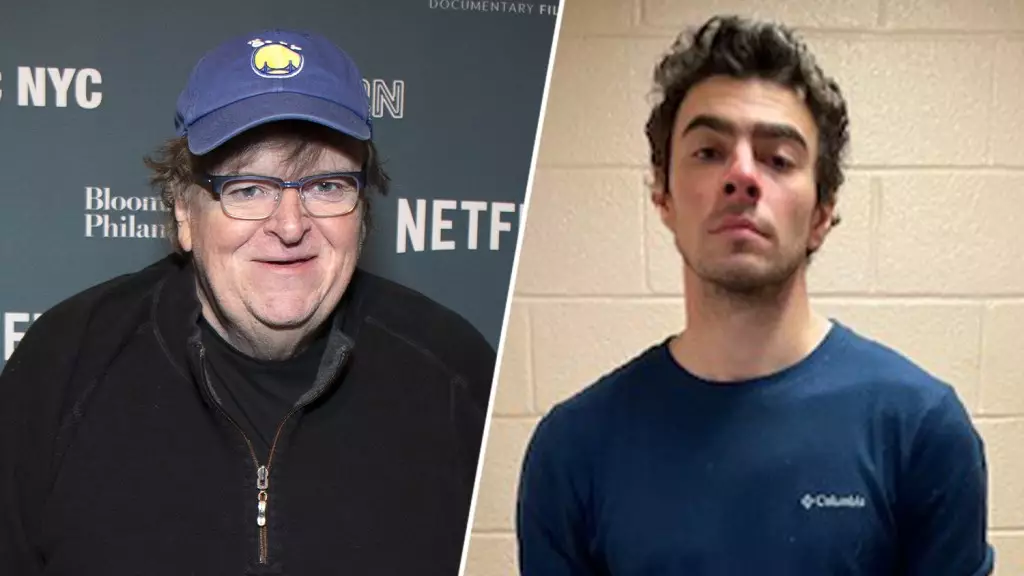The recent tragic death of UnitedHealthcare CEO Brian Thompson has ignited a surge of emotions and discussions about the broken state of the American healthcare system. Following his assassination, Luigi Mangione emerged as the prime suspect, and in the aftermath, the acclaimed filmmaker Michael Moore took it upon himself to comment on the social ramifications of this event. Notably, Mangione’s manifesto reportedly references Moore’s own critiques of the for-profit healthcare industry in the U.S. As a social advocate and vociferous critic of the current healthcare model, Moore felt compelled to address the situation.
In his open letter, Michael Moore does not mince words. He boldly acknowledges the palpable anger that has arisen in response to Thompson’s murder and rejects any attempt to stifle or condemn that outrage. “I want to pour gasoline on that anger,” he writes, suggesting that the emotion is not merely a reaction to an isolated incident but rather a culmination of years of systemic frustration. His argument hinges on the assertion that the widespread suffering caused by the for-profit healthcare industry warrants not just recognition but also action. Moore emphasizes that the resentment is justified and that it has been brewing for decades, exacerbated by the relentless cycle of medical debt that plagues millions of Americans.
In his letter, he categorizes the healthcare industry as a “thief” that has persistently exploited the vulnerable. By portraying this industry as a predatory entity, he draws attention to the severe consequences faced by those without sufficient coverage or access to healthcare services. The imagery of “mass death and misery” serves as a stark reminder of the human cost associated with the current healthcare model. Moore points out that the anger surrounding Thompson’s death implies a broader aversion to injustice rather than a direct call to violence against corporate leaders.
While Moore’s letter intensely resonates with the struggles faced by millions, it is crucial to note that he distinguishes the catastrophe of healthcare from Mangione’s criminal act. He labels the killing as “rich on rich crime,” implicating that the act of violence stems from a singular, affluent individual rather than a collective uprising against the injustices of the healthcare system. By doing so, he attempts to compartmentalize legitimate grievances with the healthcare structure from individual acts of violence, affirming that for the sake of progress, dialogue should remain anchored in advocacy rather than repercussions.
Moore critiques the situation not just as a moral outrage but as a reflection of governmental failures. He lays blame on the two primary political parties in the U.S., suggesting that they have conspired through inaction to empower and enable the malpractices of the healthcare industry. His insistence that “no one should die because they don’t ‘have’ health insurance” strikes at the heart of systemic failures where lives are often reduced to profitability, highlighting a critical discourse around the unrelenting pursuit of profit that shapes healthcare policy.
As Moore continues to advocate for a reevaluation of healthcare as a human right rather than a commodity, he encourages those who resonate with his message to take action. He parallels the outpouring of anger to the potential for a profound civil discourse surrounding healthcare reform. By linking public outcry to organized advocacy, Moore calls for a louder, more expressive acknowledgment of the system’s dysfunction.
He offers viewers a link to his documentary “Sicko,” aiming to shine a stark light on the disparities and aims to catalyze an awakening. As societal conversations evolve, patient advocacy and systemic reform appear more essential than ever. In an age where voices are becoming increasingly interconnected, it is pivotal for communities to rally together to advocate for policies that prioritize health and humanity over profit margins.
Ultimately, Moore’s letter serves as both a mirror and a rallying cry, reflecting the current societal pulse regarding healthcare issues. While it delves into the complexities of capitalism and morality within the context of healthcare, his reactions signify the urgent need for transformative change. As discourse shifts from isolated incidents to systemic critiques, the path forward involves understanding the nuances that lie within tragedy and collective anger. Engaging with these ideas empowers individuals to push for a more equitable future, ensuring that healthcare is recognized as a fundamental right rather than a privilege determined by financial capability.
